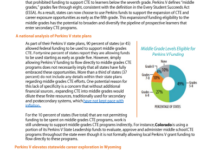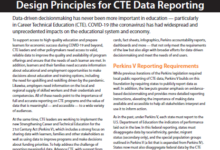The middle grades have become the agreed upon starting point for high-quality Career Technical Education (CTE) programs, as this represents a critical time for students making important decisions that may have a lasting impact on their careers. However, there lacks a common view among state and local leaders on what makes up a high-quality middle grades CTE program or policy. With the promotion of middle grades CTE in the Strengthening Career and Technical Education for the 21st Century Act (Perkins V), it is an ideal time for state and local leaders to consider how to best support and expand CTE in middle school.
To support this work, this resource from Advance CTE and Association for Career and Technical Education (ACTE) lays out a theory of action for middle grades CTE. This resource defines outcomes for student learning, 10 design principles that should undergird any middle grades CTE program or policy and core programmatic elements for developing and expanding CTE into middle grades.
This resource is aimed at state and local leaders working to develop or strengthen middle grades CTE policies, programs, and practices. This paper also includes a design principles self-assessment for state and local leaders to evaluate their current middle grades CTE policies and programs.
In addition, Advance CTE and ACTE have developed a repository of state-level resources that state and local leaders can leverage as they begin to develop and expand CTE into the middle grades. The repository includes links to resources from all 50 states and Washington, DC, including state middle grades CTE standards, career development guidance and tools, work-based learning and Career Technical Student Organization supports, licensure requirements, state policies and more.







